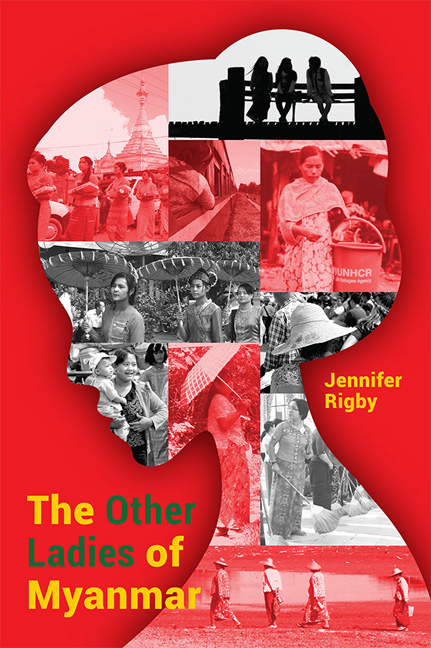Book contents
- Frontmatter
- Dedication
- Contents
- Preface
- Acknowledgements
- Introduction
- Timeline
- 1 The Activist: Cheery Zahau
- 2 The Feminist Buddhist Nun: Ketu Mala
- 3 The Survivor: Mi Mi
- 4 The Businesswoman: Yin Myo Su
- 5 The Environmental Campaigner and Princess: Devi Thant Cin
- 6 The Artist: Ma Ei
- 7 The Refugee Sexual Health Nurse: Mu Tha Paw
- 8 The Rohingya and Human Rights Champion: Wai Wai Nu
- 9 The Farmer: Mar Mar Swe
- 10 The Pop Star: Ah Moon
- 11 The Politician: Htin Htin Htay
- 12 The Archer: Aung Ngeain
- Conclusion
- About the Author
12 - The Archer: Aung Ngeain
Published online by Cambridge University Press: 08 June 2019
- Frontmatter
- Dedication
- Contents
- Preface
- Acknowledgements
- Introduction
- Timeline
- 1 The Activist: Cheery Zahau
- 2 The Feminist Buddhist Nun: Ketu Mala
- 3 The Survivor: Mi Mi
- 4 The Businesswoman: Yin Myo Su
- 5 The Environmental Campaigner and Princess: Devi Thant Cin
- 6 The Artist: Ma Ei
- 7 The Refugee Sexual Health Nurse: Mu Tha Paw
- 8 The Rohingya and Human Rights Champion: Wai Wai Nu
- 9 The Farmer: Mar Mar Swe
- 10 The Pop Star: Ah Moon
- 11 The Politician: Htin Htin Htay
- 12 The Archer: Aung Ngeain
- Conclusion
- About the Author
Summary
MOST PEOPLE have heard of Myanmar's ghost-like capital city, Naypyidaw.
Unveiled by the military junta back in 2005, and built from scratch for reportedly billions of dollars, the capital has been a soulless white elephant in the middle of the country ever since. It even has its very own white elephants (in Myanmar they are seen as lucky), living in cages at the base of the bizarre, near full-size replica of Shwedagon Pagoda on the edge of the town.
What it doesn't have, famously, is people. Instead, it has deserted twenty-lane highways, Vegas-style hotels without any guests, and golf courses frequented only infrequently by top generals and politicians. It also draws curious film crews from across the globe — the BBC's Top Gear team played football and even held a drag race on its empty boulevards on their visit.
The city was built by the regime at speed for reasons that are still vague. Rumours range from the junta's paranoia over the ease of invading Yangon to astrological predictions regarding the auspiciousness of Naypyidaw's location. Whatever the thinking, it happened quickly: civil servants were reportedly ordered to relocate there within 48 hours, although many chose to stay in Yangon and still commute on a weekly basis, via a 5-hour bus trip.
But in the new semi-democratic era, things are changing a little. Some of the politicians and civil servants of the new administration have made their homes here. Other people who live in the surrounding villages come into the city for work. And others have been drawn to its infrastructure and facilities, which are unequalled anywhere else in the country.
That's what brought Aung Ngeain, 31, here. She's a fantastically successful Burmese archer, probably the most successful ever, with twenty-seven gold medals from international competitions.
Nowadays, she works as an archery trainer, trying to find — well, trying to find the next Aung Ngeain, amid Naypyidaw's bright lights and shiny targets.
It's a long way, literally and metaphorically, from where it all started for her.
She grew up in a town in Chin state called Mindat, where her father was a teacher and her mother made cloth. She describes their background as “poor” in a state which, as we have already seen in Chapter 1, is poor enough in itself.
- Type
- Chapter
- Information
- The Other Ladies of Myanmar , pp. 117 - 123Publisher: ISEAS–Yusof Ishak InstitutePrint publication year: 2018



